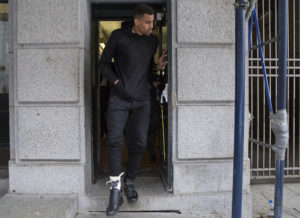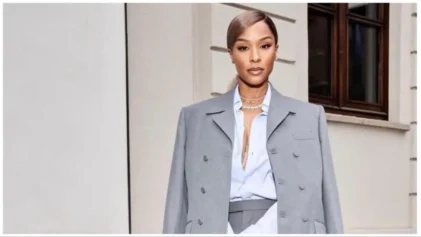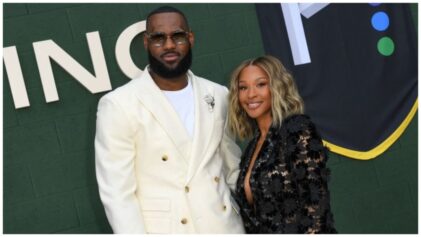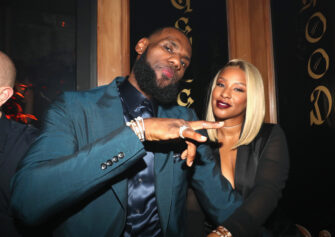
Atlanta Hawks NBA basketball player Thabo Sefolosha leaves a courthouse in New York, Wednesday, April 8, 2015. Copeland. (AP Photo/Craig Ruttle)
Thabo Sefolosha likely would not have made the difference in the Atlanta Hawks’ eventual elimination from the playoffs against the Cleveland Cavaliers—a probable sweep if the series’ pattern holds to form tonight.
But the reason Sefolosha did not have an opportunity has been wholly ignored, forgotten or, worse, disregarded.
Sefolosha, one of the NBA’s renowned good guys, suffered a broken and knee ligament damage on April 8 in New York. He says with certainty that a New York police officer did it. Cops say Sefolosha attacked an officer from behind after another NBA player was stabbed outside a nightclub. A witness said a policeman followed the Hawks’ veteran guard and as one officer held him down, another bashed his leg with a nightstick.
A video seems to confirm the witness’ and Sefolosha’s version.
Curiously, as LeBron James cut and spliced the Hawks’ defense the first three games of the Eastern Conference Finals, hardly ever was the absence of Sefolosha mentioned during game telecasts and never are the circumstances of his injury discussed on air or in print.
Consider it opportunities wasted. Police officers across the country have killed unarmed Black males at an absurd rate, and many professional athletes, including NBA players, have been vocal about their support of the #BlackLivesMatter movement. Sefolosha’s case, while not deadly, exists as an other example of law enforcement taking liberties with Black bodies.
And yet, as The Nation pointed out, hardly anyone has made the necessary fuss about this latest violation. The league, NBA Players Association and the NYPD internal affairs all are investigating. They seem to be the only entities interested in this scenario that could have far-reaching ramifications. If the cops get off, maybe pro athletes become more of a target than they already are.
Charles Barkley, for all his blabbering, has not addressed it. He recently was courted by TNT to stay another year on TV and will—get this—be a voice on racial issues in America on CNN. Considering Barkley’s past of defending George Zimmerman in killing unarmed teen Trayvon Martin, saying police did their job in choking and killing Eric Garner in New York and supporting police officers after the Ferguson uprising in response to unarmed teen Michael Brown’s shooting death by a cop, among other curious positions, it is a wonder he had not blamed Sefolosha for breaking his own leg.
The games are wonderful entertainment and should be treated as such. But when Indiana Pacers forward Chris Copeland gets stabbed outside a club in the early-morning hours in New York, and Sefolosha has his season ended during an altercation with police—especially when he, at least one witness, and a video confirms he was beaten with a club around his leg—the case merits much conversation.
“Really disappointed with what happened to Thabo,” Wizards forward Rasual Butler told The Washington Post. “Sefolosha is a big guy compared to normal people and probably some of those police officers. So if he did anything to warrant that, that’s one thing. But the stories that we get, he didn’t do anything to warrant that. I understand that they have a scary job to do and they want to use force to make sure they get home at night. It’s understandable, but somebody in that group had to know that was Thabo Sefolosha. Somebody in that crew knew that was an NBA player. I feel like it’s another way it could’ve been handled.”
Sports Illustrated reported that a person close to the situation said, “one officer focused on Sefolosha (6-foot-7, 215 pounds), and then he continues to track him down the block like a D-back tracking a receiver. Sefolosha turns to him and asked in substance what the officer’s problem was with him.” Sefolosha was then knocked to the ground, where according to video, an officer wails away at his lower body with a club.
Sefolosha, whose father is a Black South African musician, was jailed for resisting arresting, preventing police from setting up a crime scene and disorderly conduct. A defensive stalwart, he might not have fared any better than his teammates in trying to contain James, the powerful Cavs megastar. But his opportunity to try should not have been decided by the force of a policeman’s baton.
This is not the first time police have been overzealous with NBA players. Former slam dunk champion Dee Brown was slammed to the ground outside of Boston by police because a bank robber occurred near by. The Nation pointed out a pepper-spraying incident with Chris Webber when he was judged too slow in ending a cell phone conversation when stopped by police. And former Indiana Pacer Dale Davis was tased when he was frustrated with harassment by police.
Sefolosha’s violation is different and can be significant because the country’s awareness of police excessive force against Black men is heightened. He was certain about what happened, and with his impeccable reputation and the increasing distrust of police, who would you believe?
And the argument that the player should not have been out at 4 a.m. has no merit. He—they—should not have to live in a bubble and curl up to Jimmy Fallon every night.
Sefolosha, on advice of lawyers has only said, “I will simply say that I am in great pain, have experienced a significant injury and that the injury was caused by the police.”
With that he said a lot. Too bad others with microphones in front of them are not saying anything.


